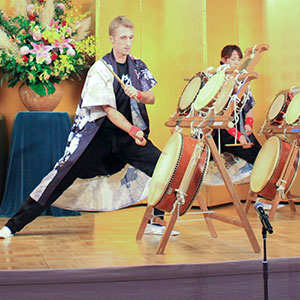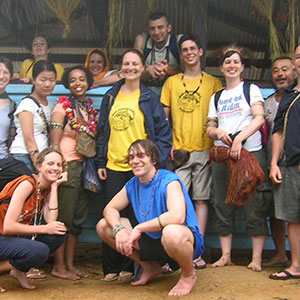Second in our series on JET alumni
Now in its 27th year, the Japan Exchange and Teaching (JET) Programme has welcomed over 55,000 people from 62 countries to deliver grassroots international exchange between Japan and other nations. This column will feature former JETs, both in the UK and Japan, who keep the idea of fostering mutual understanding firmly at heart.
I was on the Japan Exchange and Teaching (JET) Programme in Shiokawa-machi, Fukushima Prefecture, from 1996 to 1998. Looking back, I realise I applied for the wrong reasons: in short, I didn’t have a clue what else I wanted to do on leaving university and JET sounded like a fun way of delaying any serious life decisions for at least a year.
I was a ju-jitsu practitioner and hoped that spending time in Japan would provide an opportunity to hone my skills. Despite the lackadaisical reasoning behind my application, it was one of the best decisions I ever made.
The two years I spent in Shiokawa-machi have left me with many wonderful memories: participating in local festivals, learning traditional Japanese dance, aikido and judo, taking part in compulsory karaoke sessions, and being surrounded by the awe-inspiring countryside.
But it was the welcome and kindness shown by everyone I met that will last longest in my mind.
That’s not to say there weren’t challenges. As I am not a natural linguist, I always struggled with the language. Nor could I drive, so it was necessary to arrange for teachers to take me to the more remote schools where I taught.
Moreover, I had to cycle for 40 minutes to reach my nearest JET neighbour. But, my Japan experience left me more independent and confident than I had ever been, with a belief that I could try anything, and adapt to living anywhere.
This freshly found confidence and love I discovered of experiencing a new country are the reasons for which I applied to work at the Foreign & Commonwealth Office (FCO), although I had no idea that my new job would take me back to Japan.
I joined the FCO in September 2002. Knowing that Tokyo would be a popular request, I tried to be realistic about my chances of securing a posting there. So I couldn’t believe my luck in March 2005, when I was told that I would be heading to Japan’s capital the following year to take up a role as HM vice-consul at the British Embassy Tokyo.
When I started in that challenging new role in August 2006, the exposure that JET had given me to Japanese culture and customs was, again, invaluable. The job largely involved helping British nationals who had found themselves in trouble.
I saw Japan from a different perspective: through prisons, hospitals and institutions for the mentally ill. But there are similarities across such establishments, and my experience working in schools was useful background knowledge.
Again, I was struck by the kindness of strangers, especially in a capital city. I couldn’t help but draw comparison with my life in London, where I didn’t know the names of some of my neighbours. By contrast, I think I had visited nearly every flat in my apartment block within three months of arriving.
My second stint in Japan was even more life changing than the first. By the time I returned home in October 2009, I had been promoted to the post of consul, and my family had expanded by two: a dachshund called Peanut, and my beautiful daughter, Indigo.
Indy was born in a Shinjuku hospital in September 2007. She will be seven this September, but has never tired of telling people she is from Japan, or of devouring sushi.
For the first couple of years after coming back to the UK, she was my major link to the country. Yet somehow, once Japan has got under your skin, it seems to find a way of coming back into your life.
My current role is as major sporting events manager in the FCO’s sporting opportunities unit, which was set up to explore ways of harnessing soft power and economic opportunities after the London Olympic and Paralympic Games in 2012.
With Japan hosting the Rugby World Cup in 2019 and Tokyo 2020, it was inevitable that I would once again be involved with Japanese stakeholders. As a result, I attended a dinner in May for Prime Minister Shinzo Abe at the Guildhall, London.
I am not sure whether Japan will continue to play a part in my FCO career once this role is over, but I do not underestimate the positive effect my experiences there have had in both my work and private life.
Even if my job doesn’t take me back for a few years, I have promised Indy that we will return for the Games in 2020, and eagerly have started to plan the trip.






